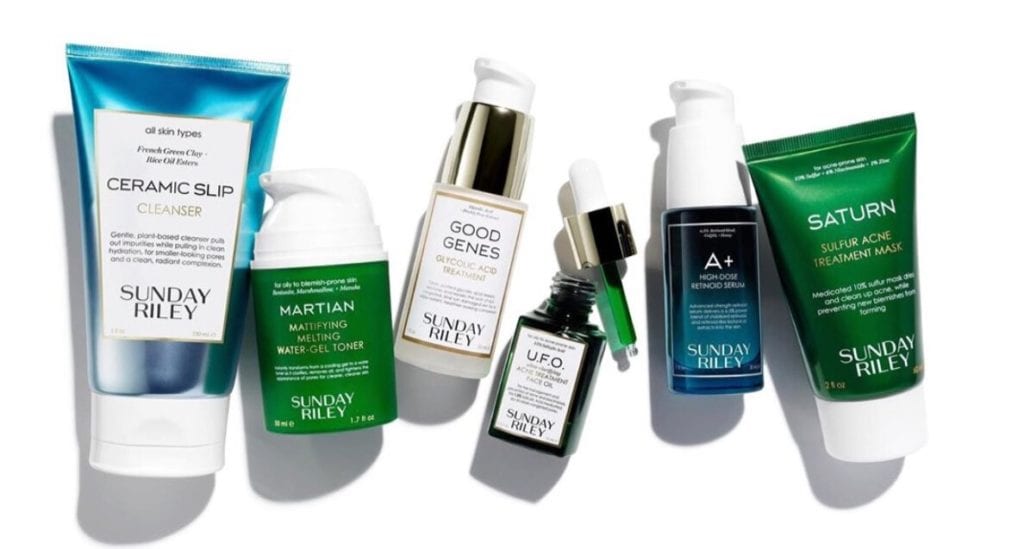A year after buzzy skincare startup Sunday Riley first came under fire after a former employee revealed that the company enlists individuals within its ranks to “write fake reviews [about its products] on Sephora.com” in order to entice consumers to purchase its skincare goods, the company and its CEO have agreed to enter into a settlement with the Federal Trade Commission (“FTC”) to bring an end to an until-recently-pending complaint, which accused the beauty co. of running afoul of the law.
According to the complaint that the FTC filed last year, Sunday Rose and her eponymous Houston, Texas-based beauty brand allegedly “violated the provisions of the FTC Act” when managers for the buzzy startup, “including Ms. Riley herself,” posted fake 5-star “reviews of [the brand’s] products on Sephora’s website” between November 2015 and August 2017, all while obscuring their identities by creating “fake accounts” and using “an Express VPN account [to] . . . hide [their] IP addresses and locations.”
In its complaint, the FTC pointed to a July 2016 email that Ms. Riley allegedly wrote to her staff directing them to “create three accounts on Sephora.com, registered as different identities” as proof that the company’s management also “requested that other Sunday Riley Skincare employees” also post fake reviews endorsing the brand’s products. The email “included step-by-step instructions for setting up new personas and [how to] use a VPN to hide [an individual’s] identity.” It also “directed employees to focus on certain products,” to “[a]lways leave 5 stars” when reviewing Sunday Riley Skincare products, and to “dislike” negative reviews. “If you see a negative review – DISLIKE it,” Ms. Riley wrote, “After enough dislikes, it is removed. This directly translates into sales!!”
Such actions by the company’s founder and employees give rise to two violations of the FTC Act, according to the government agency, including: 1) making false or misleading claims that the fake reviews reflected the opinions of ordinary users of the products; and 2) deceptively failing to disclose that the reviews were written by Ms. Riley or her employees.
Following a formal FTC investigation of Ms. Riley’s and Sunday Riley Modern Skincare, LLC’s “use of fake reviews to boost sales,” the FTC – a federal entity tasked with promoting consumer protection, and eliminating and preventing anti-competitive business practices – weighed in on a proposed consent order on October 21, with three of the Commissioners voting in favor, while two dissented.
True to FTC form (when it comes to fashion/beauty and influencer endorsements, at least), in lieu of any monetary penalty, the proposed settlement means that Sunday Riley – the company and the individual – will be prohibited “from misrepresenting the status of any endorser or person reviewing the product.”
The settlement also bans Sunday Riley from “making any representation about any consumer or other product endorser without clearly and conspicuously disclosing any unexpected material connection between the endorser and any respondent or entity affiliated with the product.”
Additionally, the FTC’s proposed settlement order – which will only be finalized after a 30 day comment period after which the Commission will decide whether to make the proposed settlement final or not – “requires [Sunday Riley] to instruct their employees and agents about their responsibilities to clearly and conspicuously disclose their connections to the [the company’s] products in any endorsements.”
More striking than the FTC’s proposed settlement is a separate statement issued by Commissioner Rohit Chopra, joined by Commissioner Kelly Slaughter, both of whom voted against the terms of settlement and who argue that the settlement in its current form simply is not strong enough.
“Today’s proposed settlement includes no redress, no disgorgement of ill-gotten gains, no notice to consumers, and no admission of wrongdoing. Sunday Riley and its CEO have clearly broken the law, and the Commission has ordered that they not break the law again,” the statement asserts. Commissioners Chopra and Slaughter argue that “the proposed settlement is unlikely to deter other would-be wrongdoers,” and instead, actually “sends the wrong message to the marketplace: dishonest firms may come to conclude that posting fake reviews is a viable strategy, given the proposed outcome here.”
The fact that “monetary relief can be difficult to calculate should not deter the FTC from seeking it,” the Commissioners assert, noting that “when the agency’s estimates are uncertain, the Commission sometimes demands no monetary relief whatsoever, which leads to under-deterrence of blatant fraud and dishonesty.”
As such, they declare that “going forward, the FTC should seek monetary consequences for fake review fraud, even if the exact level of ill-gotten gains is difficult to measure,” particularly since “fake reviews distort our markets by rewarding bad actors and harming honest companies, [and] the problem is growing.”
Founded in 2009, Sunday Riley made its name thanks to its eponymous founder’s quest “to buy the purest, A-grade raw materials and to make sure they’re formulated in a way that’s effective,” according to the Wall Street Journal. As for the complexity of the brand’s “transformative ingredients,” Ms. Riley told the paper that “the person selling [advanced skincare products] at Sephora probably has no idea.” It turns out, the reviews on Sephora’s website when it comes to Sunday Riley products are not terribly helpful, either.














